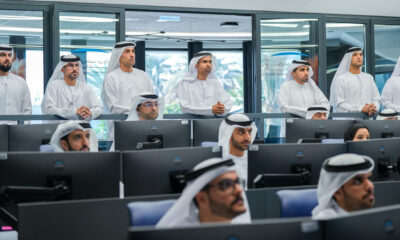News
UAE Announces Freezone For Digital & Virtual Asset Companies
Applications will be allowed during the second quarter of 2023.

His Highness Sheikh Saud bin Saqr Al Qasimi, the ruler of Ras Al Khaimah and UAE Supreme Council Member, has set plans in motion to establish the world’s first digital and virtual asset company freezone.
The independent governmental authority known as the RAK Digital Assets Oasis is affiliated with the newly created Department of the Future. The recently implemented law grants the RAK Digital Assets Oasis complete financial, administrative, and legislative independence, allowing it to function as a purpose-built free zone for the virtual assets sector.
Also Read: Riyadh Air Makes Multi-Billion Dollar Deal With Boeing
“The Emirate of Ras Al Khaimah has been playing a leading role in national efforts to strengthen the UAE’s diversified, sustainable economy. With the nation’s focus on digitalization and encouraging enterprises of the future, RAK Digital Assets Oasis will serve as the gateway for global digital and virtual assets companies to establish their operations and grow their business,” says His Highness Sheikh Saud bin Saqr Al Qasimi.
The Ras Al Khaimah Digital Assets Oasis freezone opens for applications in Q2 of 2023. The government hopes to attract innovators and startups in a range of sectors, including the metaverse, blockchain, virtual asset wallets, NFTs, and other Web3-related businesses.
News
Influencer Growth Fuels Saudi Creator Economy Surge
The Kingdom’s creator economy grew over 32% in Q1 2025, fueled by TikTok, UGC, and cost-per-action (CPA) influencer models.

Saudi Arabia’s creator economy saw a significant 32.37% growth in the first quarter of 2025, driven by an uptick in influencer marketing, content-driven e-commerce, and the increasing influence of user-generated content (UGC). These insights come from a recent study by Admitad and the Stllr Network.
Much of this momentum is coming from video-based platforms, where brands are leaning on creators who feel more relatable than polished ad campaigns. The trend shows a clear preference for authenticity, as audiences gravitate toward content that feels real and personal.
Mohannad Alzahrani, Co-founder and VP KSA of Stllr Network, highlighted the shift: “The rise of user-generated content (UGC) is changing the way brands engage with consumers. Audiences trust real creators more than traditional advertising, making UGC a key driver of authenticity and sales”.
TikTok remains the dominant platform in this space, reportedly reaching 88% of the Saudi population. It also showed the sharpest rise in influencer-led transactions. Other platforms followed with solid, if less dramatic, growth: X was up 17%, Instagram increased by 12%, and Telegram by 10%.
In terms of content niches, beauty led the pack with a 56% growth rate, followed by lifestyle at 45.8% and fashion at 18.2%. Tech content also showed healthy traction at 10.6%, while entertainment, food, fitness, parenting, and gaming posted smaller — but still positive — gains.
Also Read: Top E-Commerce Websites In The Middle East In 2025
The report analyzed more than 300,000 influencer-driven purchases. These efforts translated into a 15% year-on-year jump in Gross Merchandise Value (GMV) and a 5% increase in the number of orders in 2024. Influencers themselves are seeing the benefit, with average order values hitting $54 and creator earnings rising by 14%.
A noticeable trend is the move away from fixed-rate deals. More influencers in Saudi Arabia are embracing hybrid compensation models — especially cost-per-action (CPA) setups that tie their earnings directly to performance.
As Anna Gidirim, CEO of Admitad, explains, “The CPA model brings much-needed transparency to influencer marketing. Brands only pay for actual results, and influencers benefit by securing long-term partnerships while offering their audiences exclusive promo codes and special discounts”.
However, the ecosystem still shows a gender imbalance. The data indicates that 63% of creators in Saudi Arabia are men, while women account for just 37%.
























